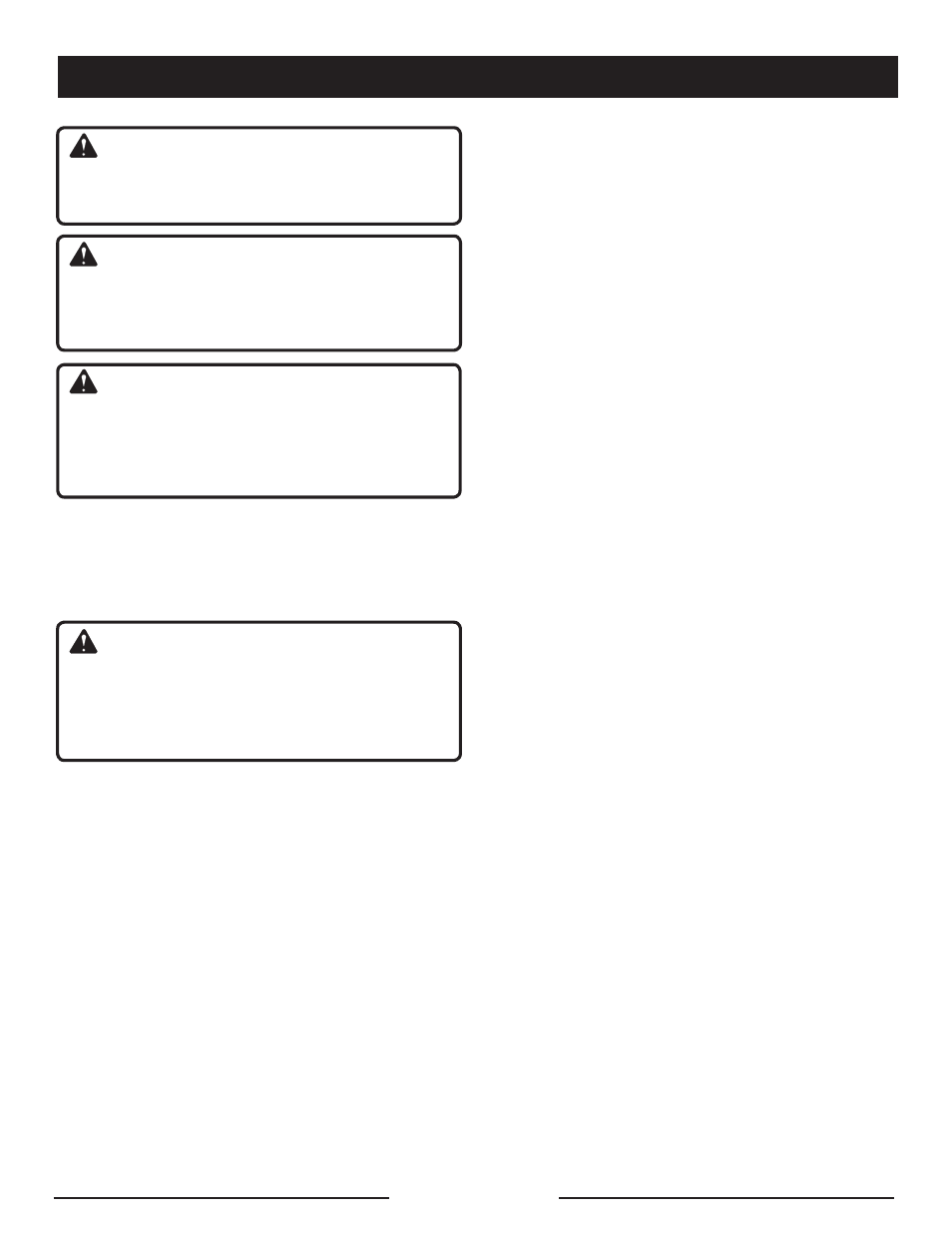Maintenance – Ryobi RY80518 User Manual
Page 18

Page 14 — English
WARNING:
When servicing, use only identical replacement parts.
Use of any other parts could create a hazard or cause
product damage.
WARNING:
Always wear eye protection with side shields marked to
comply with ANSI Z87.1. Failure to do so could result in
objects being thrown into your eyes resulting in possible
serious injury.
WARNING:
Before inspecting, cleaning or servicing the machine, shut
off engine, wait for all moving parts to stop, and discon-
nect spark plug wire and move it away from spark plug.
Failure to follow these instructions can result in serious
personal injury or property damage.
GENERAL MAINTENANCE
Avoid using solvents when cleaning plastic parts. Most
plastics are susceptible to damage from various types of
commercial solvents and may be damaged by their use.
Use clean cloths to remove dirt, dust, lubricant, grease, etc.
WARNING:
Do not at any time let brake fluids, gasoline, petroleum-
based products, penetrating lubricants, etc., come in
contact with plastic parts. Chemicals can damage,
weaken or destroy plastic which could result in serious
personal injury.
Only the parts shown on the parts list are intended to be
repaired or replaced by the customer. All other parts should
be replaced at an authorized service center.
Before running the engine, perform the following pre-
operation steps:
Check that all bolts, nuts, etc., are securely tightened.
Make sure the air filter is clean.
Check both the engine lubricant level and the fuel tank
level; refill as needed.
Inspect the work area for hazards.
If there is excessive noise or vibration, stop the unit
immediately.
NOZZLE MAINTENANCE
See Figure 18.
Excessive pump pressure (a pulsing sensation felt while pull-
ing the trigger) may be the result of a clogged or dirty nozzle.
Turn off the pressure washer and shut off the water sup-
ply. Pull trigger to release water pressure.
Remove the nozzle from the spray wand.
NOTE: Never point the spray wand at your face.
To free any foreign materials clogging or restricting the
nozzle, blow out or remove debris with a straightened
paper clip or fine needle.
Using a garden hose, flush debris out of nozzle by back
flushing (running the water through the nozzle backwards
or from the outside to the inside).
Reconnect the nozzle to the spray wand.
Turn on the water supply and start the engine.
CLEANING/REPLACING THE AIR FILTER
See Figure 19.
A dirty air filter will cause starting difficulty, loss of perfor-
mance, and shorten the life span of the engine. Check the
air filter monthly. For best performance, replace the air filter
at least once a year.
NOTE: DO NOT remove the shroud as you could disconnect
or loosen the wire connecting the OFF switch to the engine
making it inoperable.
Press in on the tabs to open the cover.
Remove the air filter cover.
Lift the edge of the air filter carefully and pull it out.
Wash the air filter with warm, soapy water.
Rinse and let dry.
Put small amount of engine lubricant (SAE 30) on the filter
sponge. Squeeze out the excess lubricant then reinstall
the air filter.
NOTE: Make sure the filter is seated properly inside the
cover. Installing the filter incorrectly will allow dirt to enter
the engine, causing rapid engine wear.
To reinstall the air filter cover, insert the tabs into the
notches. Close the cover and push the latch until it snaps
into place.
CHECKING SPARK PLUG
See Figure 20.
Clean the area around the base of the spark plug before
removing to keep dirt and debris out of the engine. Re-
move spark plug.
Clean off carbon deposits on the spark plug electrode
using a plug cleaner or wire brush. Replace the plug if
worn or reuse is questionable. For replacement spark
plug, see
Product Specifications earlier in this manual
or the accompanying engine manual, if applicable.
MAINTENANCE